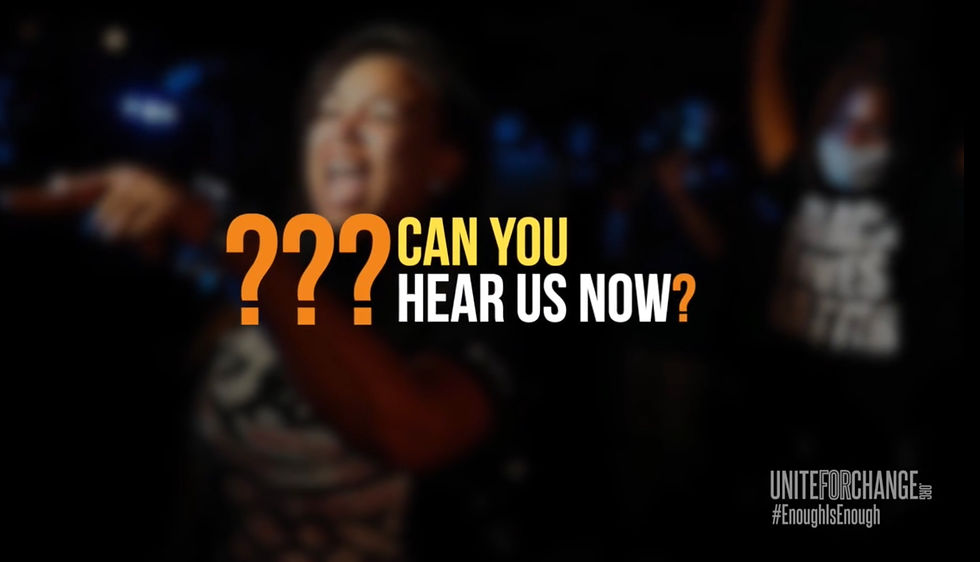Can You Hear Us Now?
- Pastor G

- Jun 10, 2020
- 4 min read
Updated: Jun 20, 2020
I'm wondering why people are just waking up all over the world to the injustices that so many people of color have faced for centuries. Yet there are many within the church, Christians, who are making plans to go back to their segregated churches, in their segregated communities and preach and listen to sermons from 1 Corinthians 12: 26 and 27 “If one part suffers, every part suffers with it; if one part is honored, every part rejoices with it. 27 Now you are the body of Christ, and each one of you is a part of it.”

The only thing I can think is that there are Christians who just don’t hear what black America has been screaming for decades. You’re on a different frequency. We are on FM and you’re on AM and when we quote George Floyd’s dying words, “I can’t breathe” you simply can’t hear us. We’re telling you why we don’t condone the rioting and violence, and at the same time how we can understand why people are marching, rioting a looting in the streets. And for some reason you can’t hear us! We are screaming that there’s a connection between black on black and blue on black crime. And for some reason you can’t hear us! We are passionately explaining how our human desire for trust has been betrayed by those who have sworn to serve and protect. Betrayal tears down the walls of trust and fractures our ability to allow anyone to get close to us. Internally, we are telling you that there’s a storm raging because we want to trust police, politicians, pastors, and business leaders but those relations have been broken. And this harms every relationship we have, especially with other Christians who we should be able to trust. If you say you’re a Christian….your #1 job should be to LOVE YOUR NEIGHBOR AS YOURSELF. I shouldn’t have to worry if you can hear me. I shouldn’t have to worry if I can trust you. Your job is to love everyone and not just those who look like you or worship with you, or go to school with your kids, or live in your neighborhood.
Watch Pastor G's video called "Can You Hear Me Now?"
And since the only thing many of my white Christian friends care about are the stores being looted and the cost of the rioting, let me tell you why that is the wrong starting point. Again, I can disagree with the violence and still understand what has lead to it. Data analytics firm Verisk Analytics Inc.’s unit Property Claim Services Inc. over the weekend declared property damage from riots in the Minneapolis area a catastrophe, meaning that insurers will pay out at least $25 million in losses. If you look at the 121 cities that have seen protests erupt and consider the cost of the looting and violence a catastrophe at an average of $25 million per city, that would add up to approximately $3 billion in damages. Now, follow this logic to understand why dismissing this movement as just a bunch of thugs and not hearing the actual underlying message behind this rage is simply idiotic. Here’s why. According to Shawn Rochester’s “The Black Tax: The Cost of Being Black In America" - What we are seeing is bigger than a lapse in moral judgement or systemic racism or COVID-19, or criminal injustice, or economic disenfranchisement, or health disparities. It’s also about the financial cost of being black in America.
No matter what the industry or activity: Housing, automotive, job search, careers, online commerce, entrepreneurship and banking and loans…after 400 years we still only account for 2% of US wealth. Protests are going on because there’s something else happening within the American system to keep things where they are. There is both a conscious and unconscious bias against people of color at work that is holding us and other minorities down and we are tired of it.
According to Rochester we’re missing 6 million African American jobs and 1.4 million businesses with staff across our black communities in America. Plus $8 trillion of net worth has vanished over the past 400 years from our communities. Can you hear me now?
a) Slavery (from 1619 to 1865) - cost us $50 trillion
b) The Present value of Black labor in 1860 - cost us $22 trillion
c) The Homeland Act (1862 to 1935) - cost us $1.6 trillion
d) Sharecropping and the Jim Crow Society (1870 to 1935) - cost us $15 trillion
e) During the Great economic expansion from 1935 to 1965
Labor vanished- costing us $44 trillion
Education disparities - cost us $2 trillion
Housing -cost us $1.75 trillion
f) Post-Civil Rights era (1960 to the present)
Six decades of a persistent Black/White employment gap - cost us 3.3 trillion
Missing intergenerational inheritance - cost us 4.2 trillion
g) And to this day we lose
$317 billion per year - to lost equity value
$20 billion per year - in missing black teachers
$30 billion per year - in lost income from Black prison population
$80 billion per year - due to a 6-decade Black/White employment gap
$72 billion to $93 billion in 2005 lost to foreclosures from discriminatory subprime lending and
$94 billion to $123 billion - lost to workplace discrimination in 1970
The total cost of being black in America is to feel the loss of over $70 trillion dollars in economic progress. Now compare that to the estimated $1 billion everyone is talking about from this uprising over the past week. Think of it this way, we would have to see this level of violence and destruction for another 23,333 days, that’s 3,333 weeks, that’s 59 more years straight to make the same dent in this country that this country has put in our communities. So, if you can add, there should be no wonder why people are frustrated, angry, tired, mad, shouting, screaming, marching and yes rioting. And now you know…. It’s not just about about the looting that’s happening. It’s about the looting that’s happened to us. Can you hear me now?

Pastor G is the founder of UniteforChange.org He is the CEO of Girt Enterprises, LLC and travels extensively training and speaking on innovative and urban servant leadership nationwide. To learn more visit: www.GirtSpeaks.com





Comments